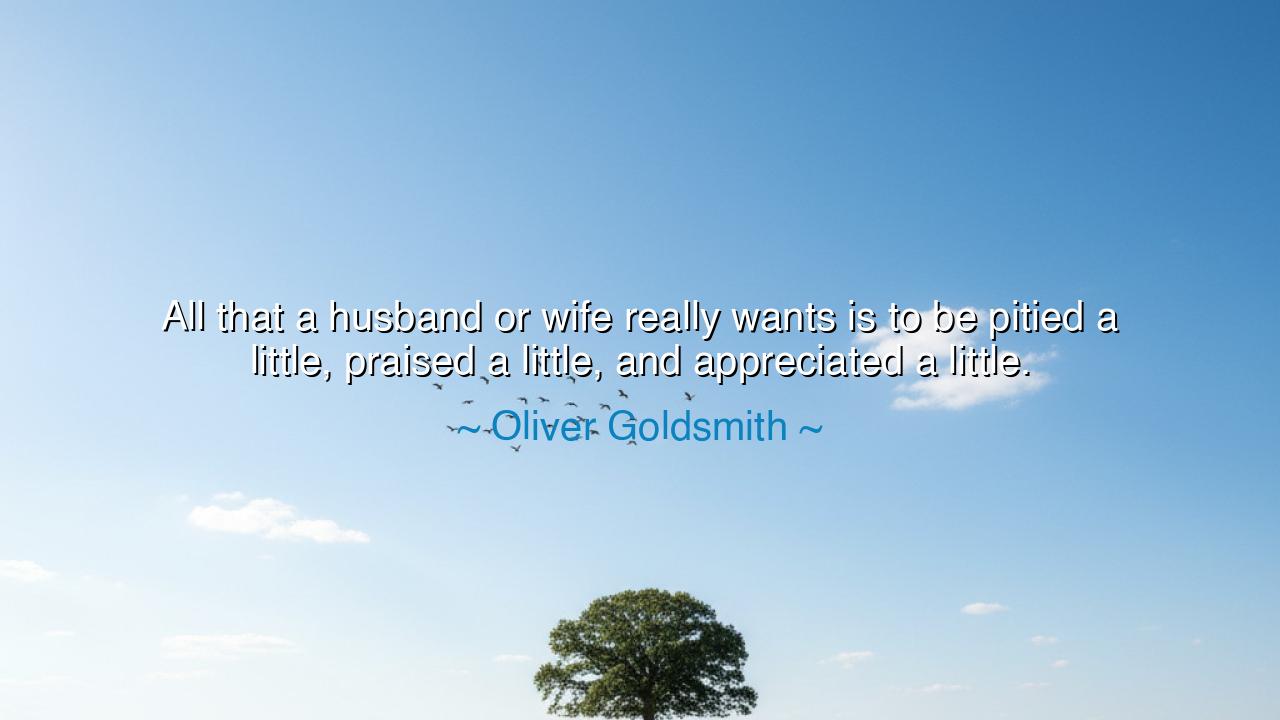
All that a husband or wife really wants is to be pitied a little
All that a husband or wife really wants is to be pitied a little, praised a little, and appreciated a little.






“All that a husband or wife really wants is to be pitied a little, praised a little, and appreciated a little.” So wrote Oliver Goldsmith, with the gentle wisdom of one who observed the human heart with care. His words may seem simple, but within them lies the secret of marriage and indeed of all human companionship. For beneath the grand gestures and lofty vows, the true longing of every soul is recognition—to be seen in weakness, to be honored in strength, and to be valued in the quiet labor of daily life.
The first desire is to be pitied a little. Goldsmith does not mean self-pity or humiliation, but the tender compassion that recognizes when one is weary or burdened. Every husband, every wife, carries silent struggles—fatigue from toil, disappointment from failure, hidden wounds of the heart. To receive pity in these moments is to be reminded: “You are not alone. I see your suffering, and I care.” Even the strongest warrior needs this balm, as Achilles needed the tears of his companions, or as Marcus Aurelius wrote of the importance of sympathy among men. Without pity, love becomes hard; with pity, it becomes merciful.
The second desire is to be praised a little. Human beings wither when their efforts go unnoticed. A wife who labors for her household longs not for riches but for words of gratitude; a husband who shoulders burdens longs not for medals but for acknowledgment. Goldsmith understood that praise is not flattery, but nourishment. Just as crops need sunlight, the heart needs recognition. History teaches us this: consider how Napoleon, despite commanding vast armies, was moved by the adoration of his soldiers. Praise lifted him as much as power. So too in marriage, the small words—“You have done well, I am proud of you”—carry more strength than gifts of gold.
The third desire is to be appreciated a little. Appreciation is deeper than praise; it is the recognition not only of deeds, but of presence. It is to say, “Your being here matters.” This is the foundation of enduring love. Many unions have faltered not from betrayal, but from neglect—when one or both partners cease to feel valued. The story of John and Abigail Adams again comes to mind: through long separations, they wrote letters filled with appreciation, not merely for each other’s work, but for their very existence. This appreciation bound them together across distance and hardship, proving Goldsmith’s truth: appreciation sustains love.
Goldsmith’s words reveal that the essence of marriage lies not in great acts, but in small, repeated gestures of the heart. To pity a little, to praise a little, to appreciate a little—these are the daily sacrifices that build a fortress of love. Too often people search for grand expressions of devotion, forgetting that it is the humble word, the tender look, the simple recognition that strengthens the bond day after day.
The lesson for us is clear: do not neglect these small gifts. Offer compassion when your partner is weary. Speak words of praise when they labor or triumph. Show appreciation not only for what they do, but for who they are. These acts cost nothing, yet they yield riches greater than kingdoms. Without them, love withers; with them, love endures.
Practical wisdom follows: begin each day with one act of pity, one word of praise, one sign of appreciation for those you love. Do not wait for grand occasions; do it in the ordinary moments—in the kitchen, at the table, before sleep. In this way, you practice the art of sustaining love. For the truth is ancient and eternal: all that a husband or wife really wants is not perfection, but to be gently seen, honored, and valued.
Thus Oliver Goldsmith’s simple phrase becomes timeless counsel. He strips away the illusions of grandeur and shows us the heart of human longing. Pity, praise, and appreciation—three humble gifts, yet together they form the crown of love. Let us carry this wisdom into our lives, for in honoring it we strengthen not only marriages, but the very bonds of humanity itself.






AAdministratorAdministrator
Welcome, honored guests. Please leave a comment, we will respond soon